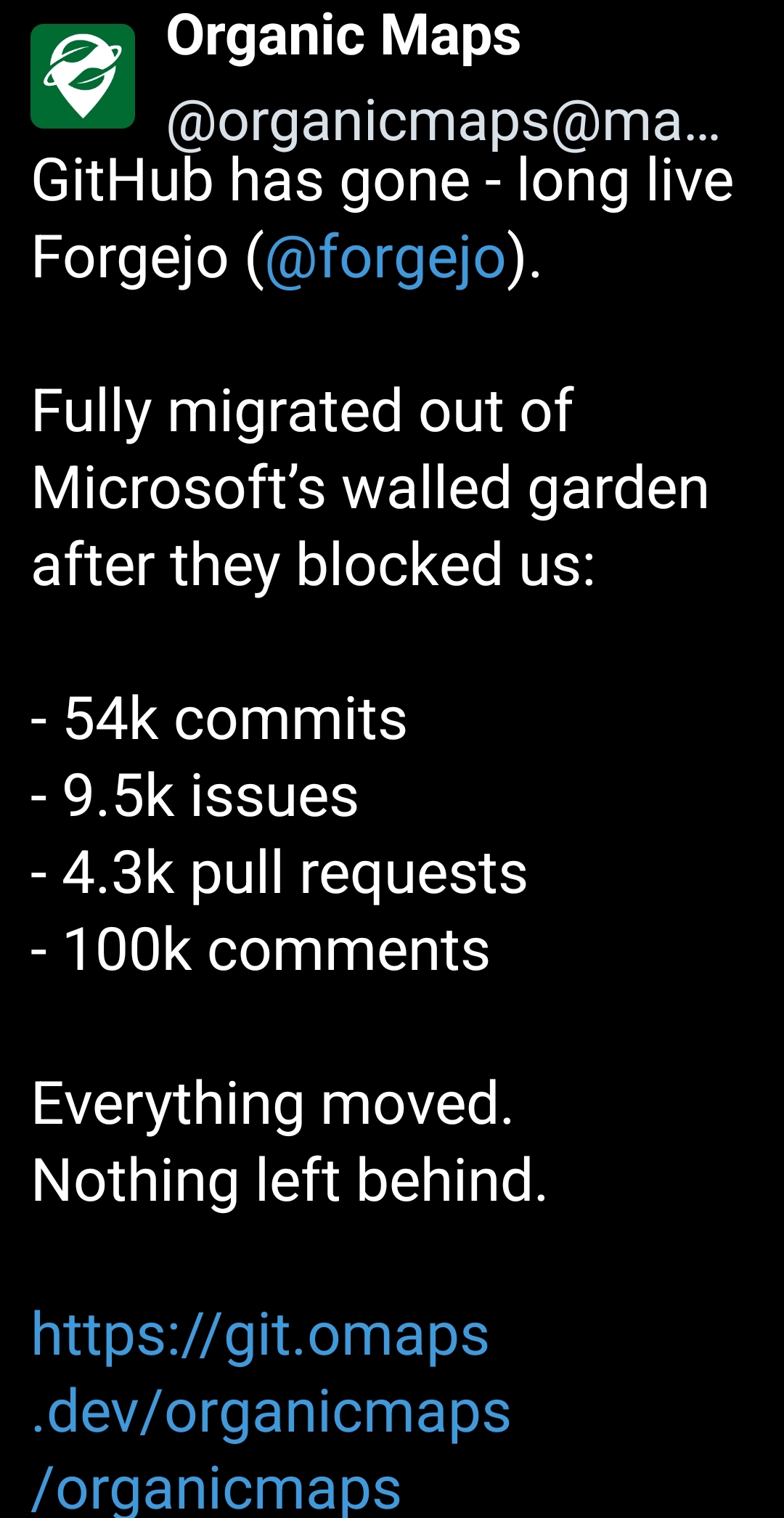Organic Maps migrates to Forgejo due to GitHub account blocked by Microsoft.
-
ai driven anti-spam is destroying the internet
Plausibly deniable attacks on political opposition.
-
I'm not trying to be like some HOLY MOUNTAIN that no unclean things can ever touch.
I'm just trying to keep myself free. I'll use people's stuff. If that starts becoming bondage, I'm out
-
We need something like Forgejo, but decentralized, like Lemmy. I don't want to create a new account for every Forgejo instance.
Have you heard of ... Git?

-
So why were they blocked.
One of their main contributors are in US sanctioned regions (Russia) so they can't access it.
-
"US sanctioned region" is russia. The developer team fully consist of russian citizens, some of them are still in russia.
Why aren't russian people allowed to upload code. Why does the US get to dictate everything
-
I prefer Gitlab CICD but there are many. Actions had a lot of potential. Then Microsoft bought GitHub and just slapped the Actions label on their CI. If you pull off the mask, it is just Azure devops.
I do too. I kinda miss Jenkins but a lot of the conveniences in GitLab's CI are really nice and it's better for 99% of use cases.
-
I think that's bad (for my personal use) because if I accidentally commit a secret key, how do I claw it back? Basically, how would I claw anything back if it's on a blockchain aka on thousands/millions of computers already (you can't).
You are correct in principle, but Lemmy isn't on a blockchain. It's much less permanent.
-
We need something like Forgejo, but decentralized, like Lemmy. I don't want to create a new account for every Forgejo instance.
Gitea has basic federation, I believe
-
Might check out Zed. Relatively new editor from the folks behind Atom and treesitter. Extremely fast with an excellent interface and vim mode. The second best vim mode behind Neovim.
Zed is great! Not as many features as IntelliJ, but insanely fast, and new features are being added all the time.
-
I think that's bad (for my personal use) because if I accidentally commit a secret key, how do I claw it back? Basically, how would I claw anything back if it's on a blockchain aka on thousands/millions of computers already (you can't).
Obviously you go and change the key instead?
-
Have you heard of ... Git?

There is no command
git issue create [hostname] [title] [description]and if there was such a command, it'd require authentication on the specific instance to prevent spam.You still need to create an account on each Forgejo instance to report a bug there...
And even, if you commit code or make a pull request... Git might be decentralized (you can develop with your friend independently from each other and merge it), but try to commit code to a GitHub project, GitLab instance or Forgejo instance without having an account there to authenticate yourself... It won't work.
-
One of their main contributors are in US sanctioned regions (Russia) so they can't access it.
-
Forgejo is such a terrible name

That's because it's using a language you don't speak.
I love Esperanto, so to me forgejo is very cool
-
I think that's bad (for my personal use) because if I accidentally commit a secret key, how do I claw it back? Basically, how would I claw anything back if it's on a blockchain aka on thousands/millions of computers already (you can't).
I did not mean decentralized hosting of the projects (e.g. your project will be on all instances).
I meant decentralized account usage (e.g. you can use your example.com forgejo account to create an issue on otherexample.org)... Just like Lemmy... I could use my reddthat.com lemmy account to create a post on your instance lemmy.world without having to register there.
-
I think that's bad (for my personal use) because if I accidentally commit a secret key, how do I claw it back? Basically, how would I claw anything back if it's on a blockchain aka on thousands/millions of computers already (you can't).
If you push a secret key you should definitely generate a new one. Way to many bots out there that scan new commits for exactly that reason
-
The issue tracker is usually the concern
Yeah, that was my point in the first comment... But not only that...
The development with multiple people is decentralized, yes...
But even, if I add 3 remotes to my repo (1 to GitHub, 1 to Forgejo instance A and 1 to Forgejo instance B), guess what happens, if you don't have an account on each of these... Try pushing code or making a pull request and see how it fails, because you are not authenticated...
-
I do, what I don't know is how Forgejo works. Doesn't having to make an account for every project mean it's already decentraliced, but just doesn't communicate between instances?
I agree that it's already kind of decentralized, so I also added the word "federated" to my original post.
-
We need something like Forgejo, but decentralized, like Lemmy. I don't want to create a new account for every Forgejo instance.
Federation is on their roadmap
-
If you push a secret key you should definitely generate a new one. Way to many bots out there that scan new commits for exactly that reason
Yeah please just rotate the secret if that happens. Doesn't matter what platform it is, this is true of GitHub as well. Secrets that are accidentally published are no longer secret.
-
Russia is being sanctioned because of its aggressive war against Ukraine.
Microsoft aren’t the bad guys for enforcing international sanctions.




